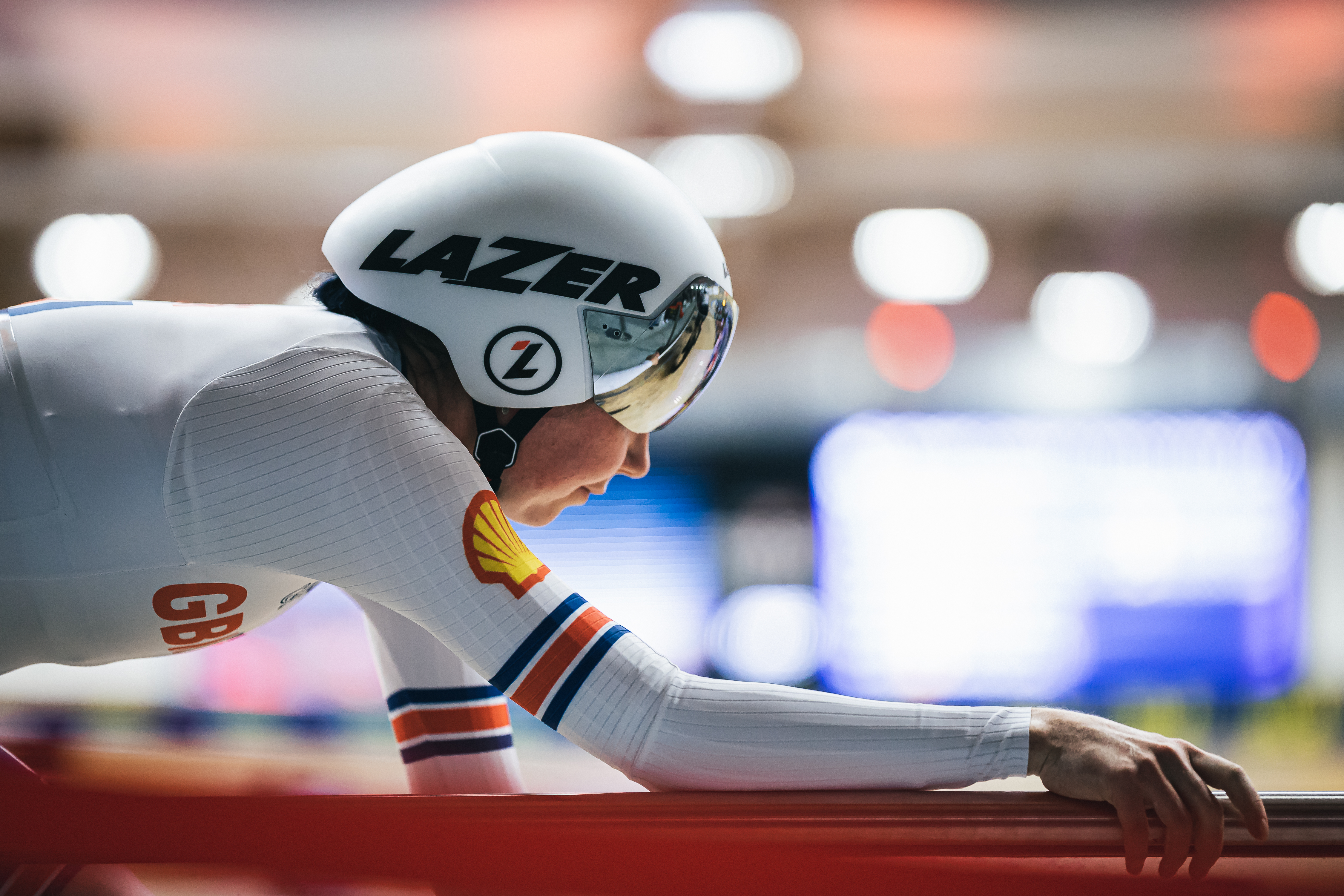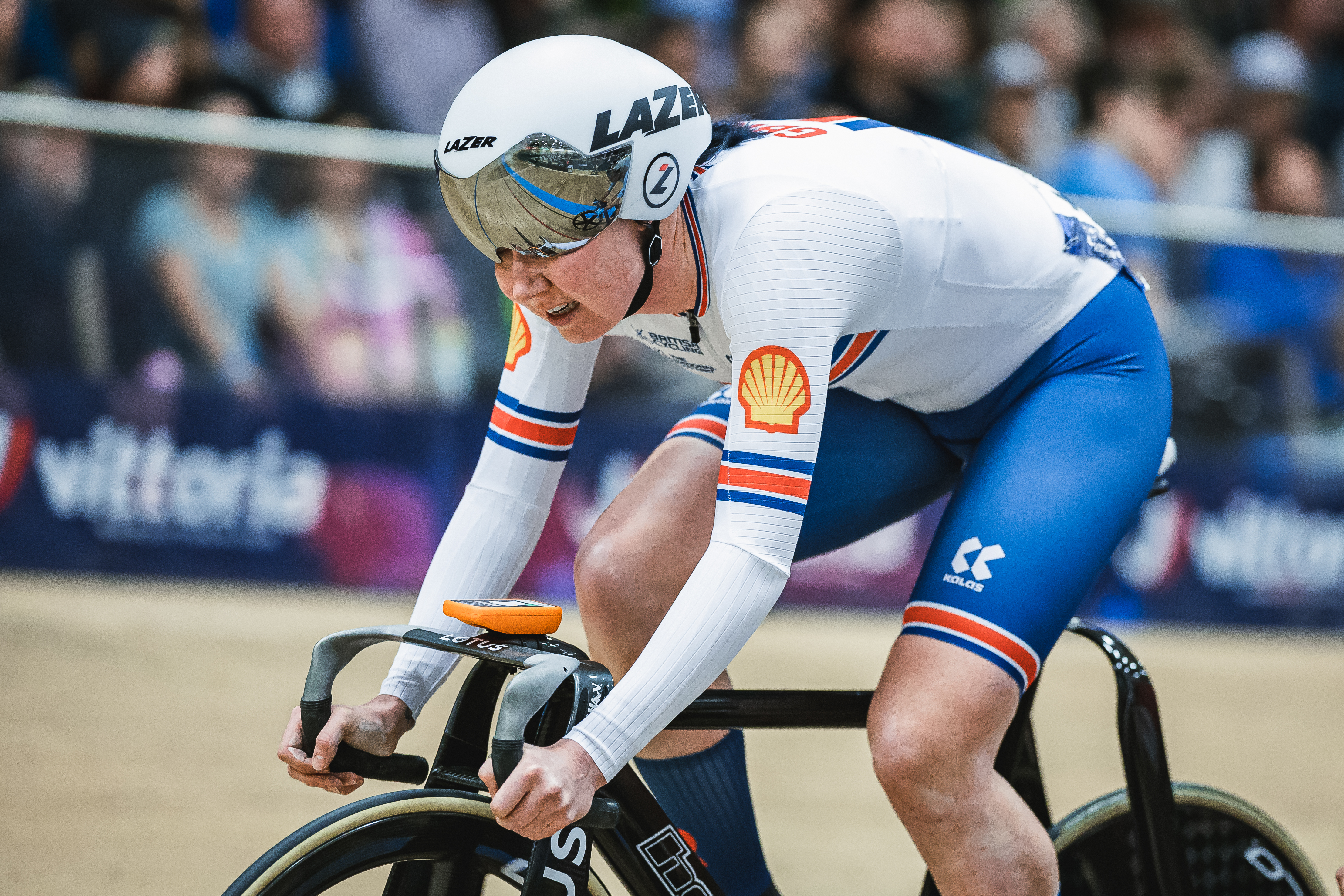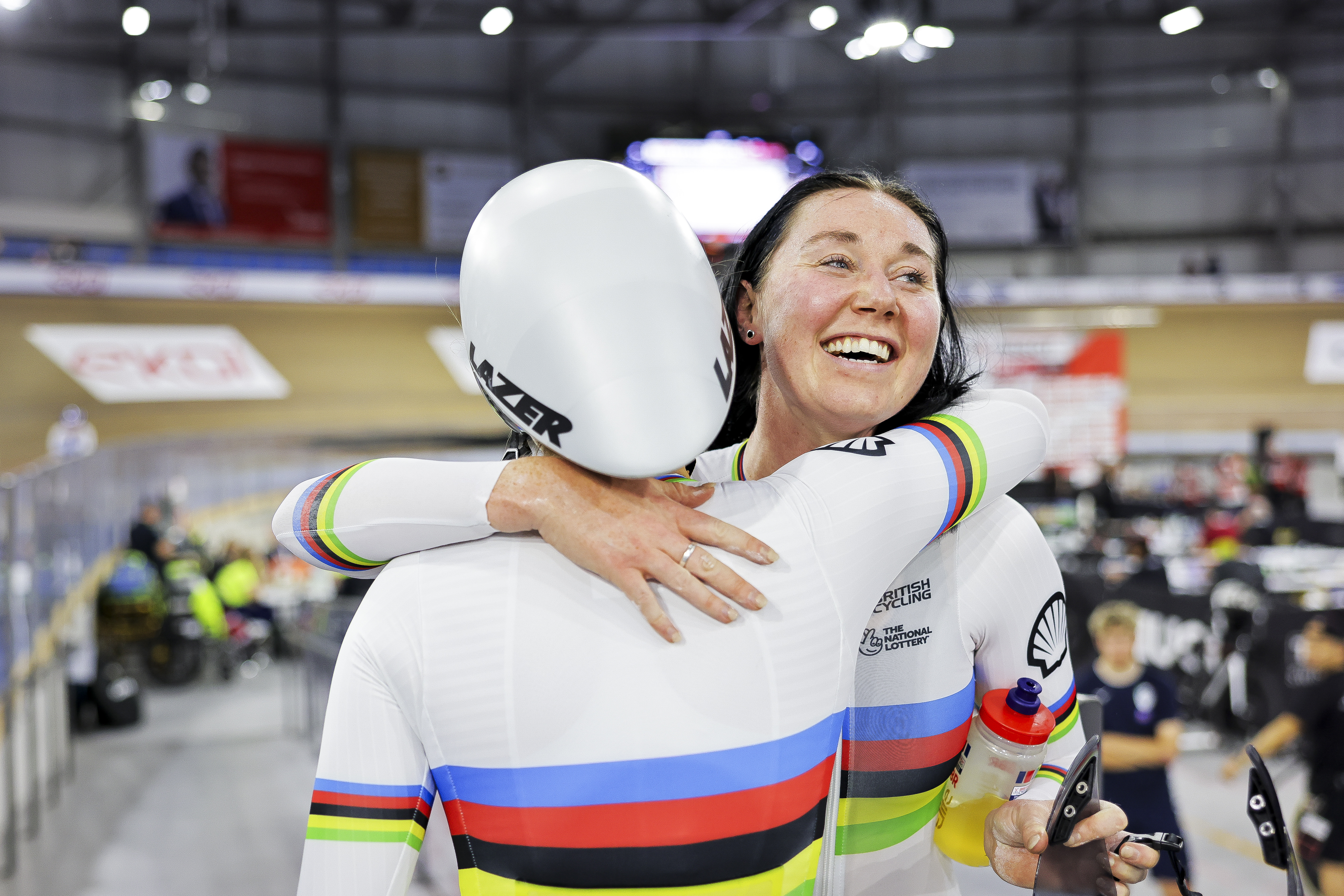
There’s a step in Katie Archibald’s garden that makes her flinch each time she sets foot on it. “I do feel a bit sick, because I’ve got to go out the same step like every day,” she says. “This is so pathetic, but pretty much every day, I hold onto the handle and take a big, really slow step. It’s just any other step, but I just can’t get my head around how inconsequential an action it was, for such a consequential outcome.”
The inconsequential action she’s talking about came in June this year. One early summer’s day, Archibald walked out into her garden and tripped on the step that now haunts her. The fall was detrimental. She dislocated her ankle, broke her tibia and fibula, and tore two ligaments off the bone. On top of the injury list, the fall ruled out her hopes of going to the Paris Olympics, where she was targeting the Omnium, Madison and team pursuit, with realistic gold medal chances in all three events.
“I’ve had friends of friends ask ‘What really happened?’ because it sounds as weird to me as anybody else. The only phrasing is freak injury,” she says, and then takes herself back to the moment. “The way I fall dislocates my foot. The dislocation breaks both the bones. The bone break rips the ligaments, and it ends up with really an injury of great consequence.
“You know if you close your eyes, and you hold your hand there, and you know what your hand looks like, and then you open your eyes and you see your hand? It was eerie. I would close my eyes, because I had fallen over, and I know where my foot is, but then I open my eyes, and it’s not there anymore. It’s facing the wrong way.”
That sight marked the start of a challenging summer for Archibald, one punctuated by hospital appointments, mental battles and recovery milestones. This week, however, only four months after an injury that left her with a leg like “spaghetti in a bag”, the Scot is back racing, part of the GB squad for the Track World Championships in Denmark. It will be her first event since missing the Olympics in August.
Archibald was lying in a hospital gurney when she first heard Paris was off the cards. “I had a surgeon say to me, ‘I’ve spoken to a specialist, and by the way, you’re not going to go to the Olympics’,” the two-time gold medallist remembers. “Because it was so quick, I was like, ‘I don’t believe you.’ I just didn’t really at first.”
Throughout her career, Archibald has lived by the mantra of keeping her ambitions high and expectations low. She was aware of the extent of her injury – who wouldn’t be? – but held onto her faith and aimed to keep her name on the reserve list for Paris. “I had this glimmer of hope,” she says. That glimmer burned out swiftly in a conversation with the GB squad’s performance director, Stephen Park.
“Sparky actually said that they’d had medical advice, and so it would be negligence to essentially give me that hope, to put me on the non-travelling reserve list, because I would keep training and this would cause irreversible damage,” the 30-year-old says. The news came within 10 days of her fall, and to many, might have felt like an arrow through the heart. For Archibald, “it was really noticeable the weight that it lifted off my chest”.
“It was somebody else’s decision, and it didn’t feel like I was the one giving up. Since then, it’s all been a pretty steep trajectory upwards.”

Following the surgery, which involved plates and pins, the Scot spent six weeks in an orthotic boot that came up to her left knee. She got “really into” swimming, and continued to do upper body work in the gym, “but none of it felt like a cathartic release,” she says. “I’d lost being able to move properly. I’d lost my sense of community a little bit, because cycling is that community for me, and my team were off on training camps, off on holding games, and then off at the Games.”
While her teammates were competing in Paris, Archibald was at the Bisham Abbey National Sports Centre, 30 miles west of London, and 300 miles from the French capital. There, she trained inside the Intensive Rehabilitation Unit (IRU), where she worked through sequences of weight-bearing exercises on her leg. There were televisions throughout the building. Did she watch any of the Olympics? “I did watch it all,” she says.
“The only emotion I felt that I was uncomfortable with – the distasteful emotion, I suppose – was jealousy more than anything else,” she explains. “I could tell that I was being standoffish, and I could tell I wasn’t being a nice person to be around. When the racing actually started, and once I could just be immersed as a fan of the sport, that was the biggest escape. It just seemed really funny that the thing I was trying to avoid thinking about, which was my Olympic dream that wasn’t happening, the best thing to distract me from that was the Olympics.”
Training progress, at first, was slow. Prior to the Olympics, Archibald had begun receiving coaching from her brother, time trial record holder John Archibald, but she "canned [him] off" when the physios told her to go back to basics. "The training was things like trying to do a calf raise,” she says. “It took me fucking two months to be able to do a calf raise.”
Come the end of August, however, and Archibald was back on a bike outdoors. Her track teammates had returned from the Olympics with eight medals, but already the Paris Games was starting to slip into collective memory. Attention turned to the next major championships: the Worlds in Denmark. Team selection would be made at the start of October. It was the motivation Archibald needed.
“The way I planned out the progression to think I’ll make it for Worlds, I had these key turbo sessions that would give feedback on my Madison form, and some key track sessions that would give me feedback on my team pursuit form. Those are my two targets at the Worlds: team pursuit and Madison,” she says.
The plan called for immediate improvement. “It had to progress so rapidly that I knew the next week would need to be longer, or would need to be more power, or faster or something, that it almost wasn’t satisfying,” she says. “You’re like, ‘Good, I achieved the bare minimum, and now there’s just another opportunity for failure next time.’ I found it really hard to get that rush that you would normally get from nailing a session.”
Then, on the final day of September, her final session arrived. “And I fucking nailed it, if I’m honest” she grins. “It just felt like a graduation.”

Today, Archibald explains, she considers herself to be at 80% of her full ability. “With physical at 80%, I can still turn up with my technical and my tactical at 100%, so there’s still a lot on the table,” she says. More importantly, though, the former Olympic champion is “happier on the bike than I’ve been in a long time”.
“I just had a serious craving to get back to training, regardless of what result it would lead to, regardless of whether I’d be any good at it. I just really wanted to get back on my bike, back onto the routine, back onto that freedom of doing what you’re good at.
“Now that I’m able to push again, the fact that I can turn up to the track sessions as a contributor, not just a burden, and all the benefits that come with being part of a team that you love, I feel so much more aware of those elements that are making me happier on the bike.”
Four months have passed since the innocuous fall, and still her legs are not symmetrical; she’s missing muscle mass on her left calf, while the ankle is larger, from both the swelling and the metalwork.
“I’ve been showing it to people, I guess for a bit of sympathy or something, and I did that to my dad, and he looks at it and he goes, ‘Well, that leg’s not going to be ready in four weeks, is it?’ This would have been, say, three weeks ago. And I was like, ‘What’s wrong with you, man? I’m trying to go either way, so please, I don’t know why I showed you this shrivelled-up calf’,” she laughs. “Now, if I’m totally honest, I kind of wish I could get the other leg all tightened up and screwed in and nice and stiff.”
The scars will always remind Archibald of that day in June. So too will the step in her garden. But while the tile that she fell on may be daunting, the 30-year-old is unflinching about her future. She feels “super motivated” for the Los Angeles Olympics in 2028. She's also looking forward to working with a new coach, and is exploring university courses to develop herself off the bike.
“This feels very much like the start of a journey for me,” she says of this week’s World Championships. “It’s a major target – it kind of always is – but I know that as far as Worlds go, this won’t be the most competitive of the four-year cycle. I will be as competitive as I can be.”







